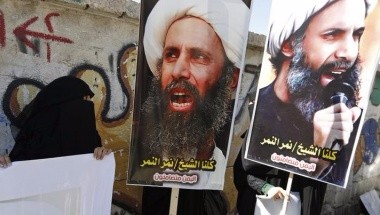
- Shi’ite protesters carry posters of Sheikh Nimr al-Nimr during a demonstration outside the Saudi embassy in Sanaa October 18, 2014. REUTERS/Khaled Abdullah/Files
Religious leaders across the Middle East are denouncing Saudi Arabia’s decision to execute a prominent Shiite cleric at the center of the country’s 2011 Arab-spring inspired protests.
He was killed along with 46 other prisoners convicted of terrorism charges in a series of executions that took place in several cities and towns throughout the country on Saturday.
Sheikh Nimr al-Nimr’s name appeared on the list of 47 names released by Saudi Arabia’s state-run news outlet, which is citing information from the Ministry of the Interior.
The executions took place under royal court order in the capital, Riyadh, and 12 other cities and towns. Of those executed, Saudi Arabia said 45 were Saudi citizens, one was from Chad and another was from Egypt.
Al-Nimr’s controversial execution could potentially spark new unrest among Saudi Arabia’s Shiite minority, largely concentrated in the kingdom’s east, and in Bahrain, which has seen low-level violence since 2011 protests by its Shiite majority demanding greater rights from its Sunni monarchy.
Al-Nimr had been a vocal critic of Bahrain’s Sunni-led monarchy, which harshly suppressed the 2011 Shiite-led protests. Saudi Arabia sent troops to help Bahrain quash the uprising, fearing it would spread.
Reaction to al-Nimr’s execution has been swift and harsh, with religious leaders throughout the Middle East and beyond condemning the actions of Saudi leadership.
Iranian cleric Ayatollah Ahmad Khatami said the fallout of the execution could bring down the Saudi ruling family, according to a report from The Guardian.
“I have no doubt that this pure blood will stain the collar of the House of Saud and wipe them from the pages of history,” Khatami told Iran’s Mehr news agency. “The crime of executing Sheikh Nimr is part of a criminal pattern by this treacherous family.”
Amnesty International has called the verdict against the cleric, who was in his mid-50s, part of a campaign by Saudi authorities to “crush all dissent.”
Before his arrest in 2012, Sheikh al-Nimr had said the people do not want rulers who kill and carry out injustices against protesters. He was asked at his trial if he disapproves of the Al Saud ruling family.
“If injustice stops against Shiites in the east, then (at that point) I can have a different opinion,” the cleric responded, according to his brother Mohammed, who attended court sessions and spoke to The Associated Press before the verdict.
Al-Nimr did not deny the political charges against him, but said he never carried weapons or called for violence. At the time of his initial arrest in 2012, protesters rallied on the streets of Qatif for his release. In 2014, when his death sentenced was handed down, mass protests were held.
Nimr was No. 46, expressionless with a gray beard, his head covered with the red-and-white scarf traditionally worn by Saudi men.
After listing the names and images of those executed, Saudi state television showed black-and-white footage of previous terror attacks in the kingdom, one showing bodies in a mosque after an attack. Soft, traditional music played in the background.
Sheikh al-Nimr’s nephew, Ali al-Nimr, had also been sentenced to death and was arrested alongside his uncle when he was just 17 years old for his participation in the protests. Amnesty International had been among several human rights groups calling for the teen’s release. The UN also issued a call for his release. His name did not appear on the list of Saturday’s executions, though it appears he is still being held.
Saudi Arabia carried out at least 157 executions in 2015, with beheadings reaching their highest level in the kingdom in two decades, according to several advocacy groups that monitor the death penalty worldwide.
Coinciding with the rise in executions is the number of people executed for non-lethal offenses that judges have wide discretion to rule on, particularly drug-related crimes.
Additional information from the Associated Press.















